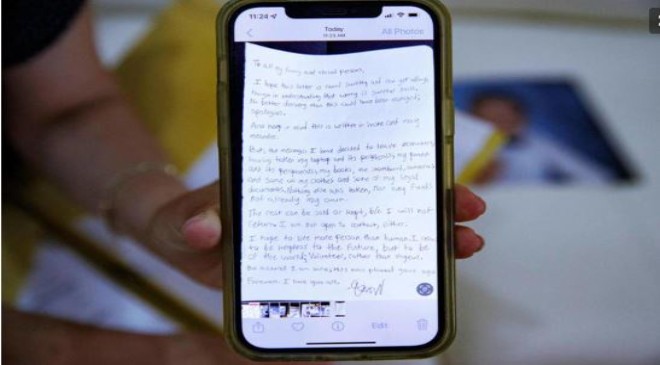On July 4, Independence Day, Alejandro Suarez packed his laptop, camera and some clothes into a book bag. He placed a handwritten note in the glove box of his blue Honda Civic and left the car in the parking lot of a Kendall church. He then hopped a Greyhound bus to Chicago to begin a new life.
“I refuse to be helpless,” he wrote. “Be assured I am safe.”
Odalys Heredia, the 20-year-old’s mother, wanted him back. She filed a report with Miami-Dade police saying Suarez was missing and endangered. She told news reporters Suarez functions at the level of a small child due to a diagnosis of autism in his childhood. And that he was friendless, and largely helpless. To authorities, she and her sister, Suarez’s aunt, offered a more outlandish sounding theory: that he may have been abducted by a dangerous band of transgender individuals seeking to harvest and sell his body organs.

The result was a missing persons drama on steroids — TV spots, police bulletins and online articles, a GoFundMe account that raised thousands, the involvement of a probate judge and a lawyer-turned-university professor who specializes in the rights of people with disabilities — a reflection of how a compelling narrative can be amplified by media, social and otherwise. It was the kind of attention that missing persons reports don’t always get.
All of it swirled around a 20-year-old college student who agreed with none of the characterizations of him and said he just wanted to quietly, unobtrusively follow his own path.
A clash of wills between mother and son is the kind of drama that happens in many homes — except theirs blew up into something much bigger.
Suarez, suddenly aware of the uproar in his wake, presented himself to a police station in Atlanta on July 6, insisting he was neither missing nor helpless nor the victim of human trafficking. He called the Miami detective in charge of finding him.
The officer put him on the phone with his family, and he restated his desire not to live at home anymore. “The missing person stated to me he was not missing and did not want to have any contact with his family,“ a Miami police report said.
“He was highly offended that the news was portraying him as a [man] with the mental capacity of a 10-year-old,” police added. And with that, authorities closed their investigations and the storm subsided.
But not entirely. Suarez’s maternal aunt, Yadira Saleh, told a Miami judge Suarez must be stripped of all rights over where he lives, what he buys and how he works. The judge signed an emergency order declaring Suarez incompetent.
According to Suarez, it “felt like I was watching a true-crime drama of myself.” He described it as “Kafkaesque” — referring to Franz Kafka, the Czech novelist who wrote about men being tormented by powerful, often unseen, bureaucratic forces.
“It really was surreal.”
Was it the report that the adult Suarez was “autistic,” although capable of driving a car and attending Miami Dade College? Or was it that the invocation of transgender organ-traffickers was a klaxon in a summer when LGBTQ rights — and especially transgender issues — had become become a cultural lightning rod? The wrangling reached its peak when Gov. Ron DeSantis went to battle with both the mighty Disney Co. and a campy Miami drag show over gender identity issues.
Brandon Wolf, spokesman for the group Equality Florida, said the experience of Suarez — who has platonic transgender friends — is best understood against the backdrop of such politics, in which the most personal, private and profound choices have been weaponized for political gain.
“Unfortunately,” Wolf said, “these are the real-world consequences of an all-out assault on LGBTQ people, and really, marginalized people broadly. Words have consequences, and they have especially dangerous consequences when they are coming from powerful leaders in our country.”
Or maybe it was nothing more than a mom who knew how to get attention.
Now living with friends in Chicago, Suarez doesn’t want to discuss sexuality or gender identity, or talk much about the current lives of his friends or himself, figuring those should be private matters, not issues to be weaponized in court or in politics. Speaking clearly and thoughtfully, he says he hopes to make more of a mark in his life than those indelibly preserved TV spots and headlines left in his wake.
As for Odalys Heredia, she said: “Since July 4th, I don’t have any life left in me. After he is no longer here, your wings fall off.”
Late bloomer
It took Suarez almost five years to begin talking, and, even then, he didn’t say much. Teachers and psychologists described him as “serious” and fretted over his poor eye contact, records provided by Heredia show. In elementary school, clinicians diagnosed the boy as having autism, and suggested his mom — his birth father lives in Kentucky — encourage social interactions.
Heredia, who spoke to the Miami Herald in her native Spanish, sent her son to private school, arranged therapy appointments and tutoring, and cheered at his swim meets. But, in a world of helicopter moms, Suarez says, his mother was a bit of a hovercraft.
He says his mother controlled what sports he could play in high school; he wanted to run track, but she insisted he be a swimmer, despite his objection that he hated attending class with chlorine on his hair and body. According to him, Heredia insisted on picking her son’s elective classes. She insisted that he keep his black curly hair trimmed short, though he wanted to grow it long, he said. She urged him to never sit with his legs crossed, he said, because that might encourage gay men to approach him.
Heredia strongly disagrees with her son’s recollections. She said she encouraged him to swim because it forced him to socialize and helped a spinal condition he had, scoliosis. She wanted him to study Spanish to improve his language skills. As to his hair, the Catholic school he attended insisted on the short length, she said. And while Heredia can’t recall instructing her son on how to sit, she adds: “Only women cross their legs.”
“Alejandro doesn’t think like an adult,” Heredia told the Herald. “I was giving him the tools so he could be an independent person. But he wasn’t ready to leave the house. … Maybe he is an adult because of his age, but you cannot call a boy with autism an adult.”
Though Suarez was diagnosed as having autism in early childhood, recent evaluations show he has mostly overcome the condition’s challenges. In 2018, a Miami psychologist wrote: “Overall, he has been able to achieve academically and adapt well to his environment with no major significant complications.”
Suarez, then 16, “did not exhibit any significant autistic traits,” the psychologist added.
When Suarez was 17, his mother complained to a neurologist of his “stubbornness, when he wants to do whatever he wants to do,” according to court records provided to the Herald.
The day before
Suarez’s family attended a barbecue at a cousin’s house on July 3, Heredia said. Suarez kept mostly to himself, except when she encouraged him to spend time with family. Heredia said her son told her he needed to drive to the Miami Dade College Kendall campus the next day to submit an overdue project in his public speaking class. She offered to go with him. Suarez declined.
The day before
Suarez’s family attended a barbecue at a cousin’s house on July 3, Heredia said. Suarez kept mostly to himself, except when she encouraged him to spend time with family. Heredia said her son told her he needed to drive to the Miami Dade College Kendall campus the next day to submit an overdue project in his public speaking class. She offered to go with him. Suarez declined.
She pauses in an interview with the Herald. “As far as I knew, he had never lied to me,” she said.
The following morning, July 4, Heredia said she awakened Suarez at around 7 a.m. Once again, Heredia said, she offered to drive with her son to campus, but he insisted on going by himself, saying it wouldn’t take long.
Home surveillance video, which Heredia shared with reporters, shows the young man walking down a set of porch stairs in jeans and a black leather jacket. He doesn’t look back.
Heredia started calling and texting her son when he hadn’t returned. He didn’t reply.
Fearing that something terrible had happened, Heredia grabbed a cousin and went looking for Suarez on campus at around 9:15 a.m., a police report said. A security guard, shown a picture of Suarez, said he’d seen the young man and asked him to move his car from the campus, closed for the holiday.
Heredia found the Civic across the street, parked at the Church of Jesus Christ of Latter-Day Saints. The car keys had been left on the ground, a police report said. Inside the sedan’s glove box was a one-page, block letter note.
“I have decided to leave,” Suarez wrote, adding he’d taken his laptop, cellphone, camera, clothes and “legal documents” — but left behind “any funds not already my own.”
“The rest can be sold or kept,” he added, “because I will not return.”
Heredia appears to have understood intrinsically what her son was conveying: She described the note to WPLG Local 10 news this way: “I wanna be free. I don’t wanna be a helpless person.”
But if the drama was principally about a young adult seeking independence, that is not how Heredia framed it with police. By the time Suarez’s bus stopped in Atlanta on July 5, he had heard from friends that his mother had reported him “missing” and “endangered.”
Heredia told police Suarez “has the mentality of a 10-year-old and is unable to function on his own.” Heredia said it was unlikely her son had left town on his own, because, a police report said, Suarez “had no friends, and was unable to socialize with anyone other than family.”
“He is an extremely loving boy,” Heredia told the Herald. “He is like an extension of my arm.”
Meanwhile, the Miami-Dade Police Department checked local hospitals, jails and the morgue. A detective was given dental records to prepare for a worst-case scenario.
“We’re all waiting for you, Alex,” Suarez’s sister, Leydis Fernández, told WPLG-Local 10. “Come home please. Don’t make mom and sister suffer.”
Privately, however, family members expressed more sinister fears: They told authorities they believed that Suarez had been abducted by a gang of transgender people who might be planning to remove Suarez’s organs.
In a statement given to Chicago police, Suarez’s aunt, Yadira Saleh, wrote that “Alejandro’s mother’s greatest fear is he may be in danger of organ trafficking or any other trafficking.”
Suarez, the aunt wrote, “was worked and groomed for weeks or months” by such predatory gender non-conformists who had encouraged him to “cut all ties with family members.”
The family did not give up easily. On July 13, a family friend created a GoFundMe page to “help bring Alejandro home.” It has raised $3,950.
“They fear he is in danger and possibly being human trafficked,” the appeal said. “To anyone who sees him, he seems like a normal 20-year-old, unfortunately that isn’t his reality. He has the mental level of a 5th-to-8th-grader,” the text added, despite the fact that Suarez had graduated high school with a standard diploma and had been enrolled in college.
The next day, eight days after Suarez appeared at the Atlanta police station, Heredia and Saleh went to probate court in Miami seeking a full guardianship over him. If approved by a judge, the procedure would have stripped Suarez of the right to make virtually any decision: where he could live, what he could buy, whether he could marry or vote — and decisions over medical care.
The emergency petition was filed by Saleh, Suarez’s aunt, because Heredia, who had been convicted in April 2008 of five counts of conspiracy to defraud Medicare and paying kickbacks, was ineligible to serve as her son’s legal guardian.
Saleh repeated the allegation that Suarez had the intellect of a child, as well as the claim he displayed “severe” and “maladaptive” behavior. She suggested he’d “fallen victim to some sort of human trafficking scheme geared to lure vulnerable adults.” Her evidence: He’d exchanged 49 phone calls with an unknown person, and Suarez “does not have many friends who he communicated with on a daily basis.”
Miami-Dade Circuit Judge Bertila Soto signed an emergency order stripping Suarez of all rights to make decisions or hold property. For the order to become permanent, however, Suarez would have to be evaluated by a panel of three experts to determine his competence. But by then, the 20-year-old was living in Chicago.
That meant, for Suarez’s relatives to take control of his life, he’d have to return to Miami.
With Soto’s order in hand, Heredia went first to Lake County, Illinois, where she thought he was, seeking help from police and the courts in “removing Alejandro from imminent danger” by force if necessary.
“Alejandro is in danger and at the hands of a very sophisticated ring that had been grooming him months before,” Saleh wrote in a statement filed with the court in Illinois. “Since the beginning this band has played a pivotal role in disarming efforts to find her son.”
Citing a United Nations report, Saleh referred to organ “recruiters” and “brokers” who “house and groom victims, medical companies, actors in the healthcare sector [who] work for individuals to cut all ties with family members.” The 2015 report, though, refers mainly to places like South Africa and Kosovo — and impoverished nations that lack justice systems or social services.
Saleh described the Illinois man who had helped Suarez leave Florida, a friend with whom he is now roommates, as a potential predator. “Please note Alejandro was never known to have any friends ever.”
When the man’s father told police the two were living in Chicago, not Lake County, Saleh and Heredia decamped to nearby Cook County, where the process began anew.
Suarez said he was going about the mundane chores of moving — registering to vote, looking for work, seeking a driver’s license — when Chicago police knocked on his friend’s door. They brandished the guardianship papers from Miami, Suarez said, and were insisting he go with them to the station.
By then, however, Suarez had hired a Florida lawyer, Matthew Dietz, who oversees a legal clinic at Nova Southeastern University that specializes in representing South Floridians with disabilities. Over the phone from Miami, Dietz instructed his client not to leave his apartment for any reason.
For about three hours, Suarez said, a sergeant and two officers stood just outside his doorway encouraging him to surrender. They told him they had a judge’s order, but never showed it to him. They said they needed to perform a wellness check. He could hear his aunt yelling downstairs.
On his lawyer’s advice, Suarez said, he closed his front door.
“Hey, open the door,” Suarez said the sergeant demanded. “We just want to ask you one simple question. And we have to get it on our body cam for it to be legitimate.”
Suarez said he left the door closed and locked.
Suarez, Dietz wrote in a court pleading, “wants his life back.”
Suarez’s freedom ultimately rested on his ability to overcome the emergency guardianship his mother and aunt had secured. On Aug. 2, Dietz asked Soto to dismiss the emergency guardianship, arguing, among other things, that the judge had no jurisdiction over a man living in another state. He also accused Heredia of “bad faith” and “fraud” for her effort to curtail the rights of a competent adult.
“It was clear that Ms. Heredia was using her [guardianship] order to convince the police to find, detain, and arrest” her son, Dietz wrote.
After a short hearing in which she ruled she lacked authority over someone who lives in Chicago, Soto signed an order Aug. 15 terminating the emergency guardianship.
“I really do feel like I have room to breathe now,” Suarez said.
Looking back over the past months, Suarez says he can finally laugh a little about the sensational, made-for-TV, true-crime flavor of it all. “Autistic man missing! Mysterious note left behind!” he said.
At some point, Suarez said, he will try to reconnect with his 33-year-old sister, his younger half-brother and several cousins around whom he was raised. “I know they miss me,” he said. “I’m certain of that.”
At this moment, though, he’s still under a bit of a storm warning. The court order his mother got from authorities in Lake County, Illinois, remains in effect, meaning he could still be detained there, Dietz said. And if he returns to Miami, his mother and aunt can still seek another guardianship.





























